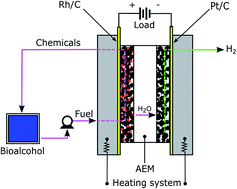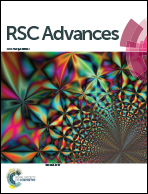Carbon supported Rh nanoparticles for the production of hydrogen and chemicals by the electroreforming of biomass-derived alcohols†
Abstract
Electroreforming is a low energy cost technology that combines the production of valuable chemicals from biomass-derived alcohols with the evolution of clean hydrogen at low temperature and atmospheric pressure. The selectivity for the desired chemicals is governed by the nature of the anode catalyst. Here we report the synthesis and characterization of a carbon supported nanostructured Rh electrocatalyst. The Rh nanoparticles are shown to be highly dispersed (2.2 nm) and a complete electrochemical study is reported. This Rh/C catalyst exhibits high activity for alcohol electrooxidation (e.g. 5700 A gRh for EG at 80 °C) and when employed with an anion exchange membrane and Pt/C cathode in an electroreformer produces high volumes of hydrogen at low electrical energy input (e.g. 500 mA cm−2 at 0.7 Vcell and Ecost = 9.6 kW h kgH2−1). A complete analysis of the alcohol oxidation products from several renewable alcohols (ethanol, ethylene glycol, glycerol and 1,2-propandiol) shows a selectivity in the formation of valuable chemicals such as lactate and glycolate.



 Please wait while we load your content...
Please wait while we load your content...